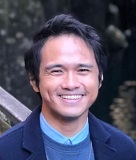STAFF
Research interest
My field of research falls within the framework of green chemistry and engineering. More specifically, it involves the development of intensification strategies in the subcritical water (subH2O) treatment of biomass into biofuels and platform chemicals. These intensification strategies include the use of carbon-based materials as catalysts, microwave irradiation as a heating mechanism, supercritical carbon dioxide (scCO2) as a solvent, and reactive separation as a mode of operation.
Biomass has been used primarily in my research because it possesses hydrocarbon chains in its structure similar to fossil fuels, albeit in different proportions of carbon and hydrogen, as well as oxygen. Therefore, it can undergo the same transformations as those of crude oil, for example, in order to produce fuels, plastics, and specialty chemicals. To accomplish these transformations, we have employed hydrothermal treatment as the core technology. In one study, we performed the conversion of glucose to 5-hydroxymethylfurfural (HMF), which is a highly versatile platform chemical in the production of fuels and plastics. The process involved the addition of supercritical carbon dioxide to provide the catalyst in the system in the form of carbonic acid. This acid was formed from the reaction between water and scCO2, which has significantly higher solubility in aqueous solutions than atmospheric CO2.
Aside from the addition of scCO2, HMF production was also performed under reactive separation. In this setup, a scCO2 was made to continuously flow through a stagnant aqueous glucose solution. Our results showed that the reactive separation allowed for a simultaneous and highly selective extraction of HMF owing to the enhanced solubility of HMF in CO2 at supercritical conditions. The raw material and side products, which were polar compounds such as glucose, fructose, levulinic acid, and formic acid, were retained in the aqueous solution.
In another study, we used graphene oxide (GO) under microwave irradiation in the depolymerization of fucoidan to fucoidan, which are the marine-based equivalent of cellulose and glucose, respectively. As a carbon-based catalyst, GO can also be derived from biomass. In the depolymerization of fucoidan, an acid catalyst is required to effectively cleave the glycosidic bonds in its structure to recover fucose. This was accomplished in our system via two mechanisms: (1) By taking advantage of the microwave absorptivity of GO, local heating on its surface supplied the necessary heat to initiate random scission in fucoidan. (2) Then the oxygen functionalities on the surface of GO, which were acidic in nature, generated the necessary catalysts in the form of hydronium ions to target the glycosidic oxygen in fucoidan and break its bond, thus producing fucose.
These studies were not only conducted from an experimental point of view, but from a theoretical perspective as well. In particular, semi-empirical quantum calculations were performed to show how glucose can be converted to 5-HMF by the Brønsted acids and bases present in the subH2O–scCO2 system. Furthermore, from DFT calculations, isopropanol was shown to facilitate hydride shifts, which are predominant in the glucose isomerization and fructose dehydration steps of HMF production, thus reducing the activation energy of the reaction. Lastly, semi-empirical quantum calculations were also performed to generate the reaction pathway for the acid-catalyzed depolymerization of fucoidan to fucose.
Research Activities
[Oral presentation in a workshop]
- YL Kam, JKCN Agutaya (presenter), AT Quitain, Y Ogasawara, M Sasaki, MK Lam, S Yuzup, S Assambumrungrat, T Kida. Graphene Oxide under Microwave Irradiation as an Effective Catalyst in the Production of Biodiesel from Chlorella vulgaris. e-ASIA Workshop and Site Visit.
2023 March 15–17. Institut Teknologi Sepuluh Nopember (ITS), Surabaya, Indonesia (online). - 8th JASTIP-WP2 Annual Workshop.
2023 January 9. CO113, TSP, NSTDA, Thailand (online).
[Participation of Internship]
- Block course titled “Chemical Sensors – Basics, Technology and Applications” hosted by the Weimar Research Group.
2023 March 6–17. Institute of Physical and Theoretical Chemistry, University of Tübingen, Germany
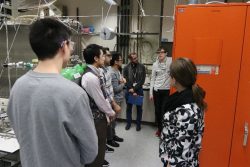
Discussion of the theory behind Kelvin probe measurements
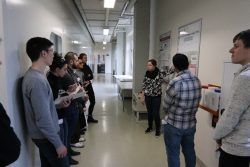
Demonstration on the use of the Kelvin probe
[Conference organizer]
- 3rd International Symposium on Green Chemistry and Engineering as part of the Sakura Science Program hosted by the Kida Laboratory.
2023 January 18. Kumamoto University, Japan.
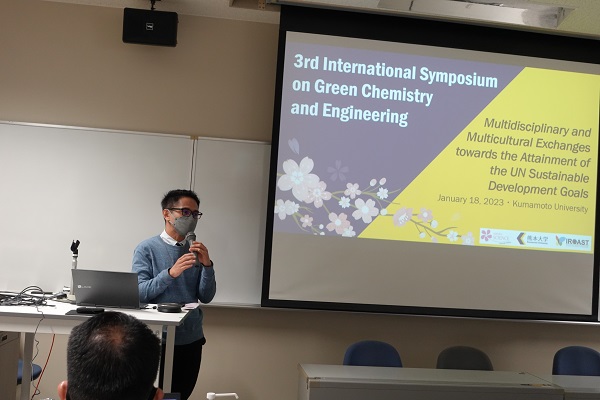
[Poster presentation in a conference]
- Jonas Karl Christopher Agutaya, Takeshi Shinkai, and Tetsuya Kida. “Elucidation of the ethanol gas sensing mechanism of ZnO using a combined DRIFTS and DFT approach”. 49th International Congress on Science, Technology and Technology-Based Innovation (STT49). Songkhla, Thailand. 2024 January 23–25.
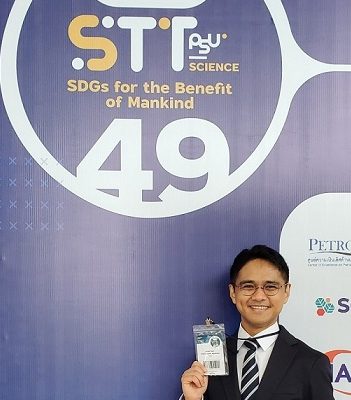
- Jonas Karl Christopher N. Agutaya, Yūki Shimada, Yūsuke Inomata, and Tetsuya Kida. “DRIFTS/DFT study of the CO sensing mechanism of Pd-loaded SnO2”. 18th International Conference on Nano/Micro Engineered and Molecular Systems (IEEE-NEMS 2023). Jeju, Korea. 2023 May 14–17.
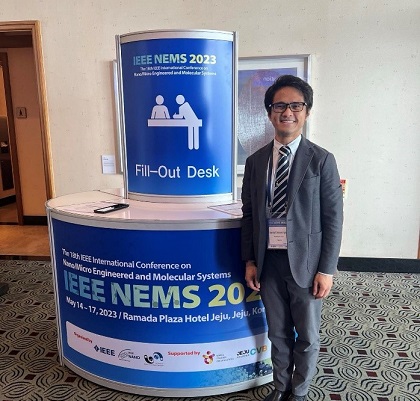
- JKCN Agutaya (presenter), T Shinkai, Y Inomata, AT Quitain, T Kida. Theoretical study of the formation of hydroxyl groups on Pt-doped ZnO(10-10) from the heterolysis of water. 48th International Congress on Science, Technology and Technology-based Innovation (STT 48).
2022 November 29 – December 1. Walailak University, Thailand
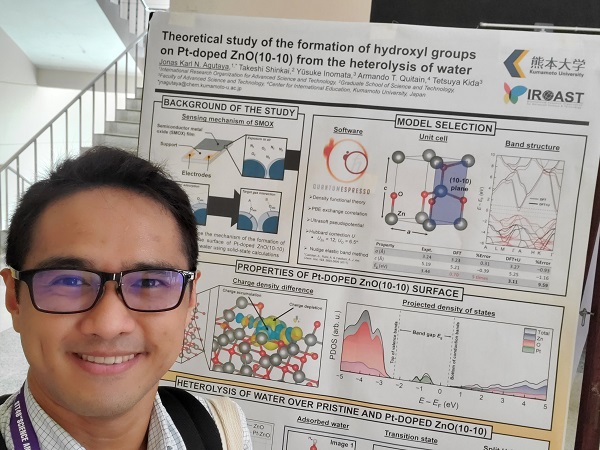
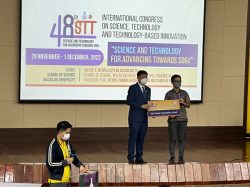
Poster at the SST 48 conference in Thailand Awarding ceremony at the 48th STT
[Co-authorship of a paper]
- Nishizono, M.; Soreli, C.; Issasi, C.; Agutaya, J. K. C. N.; Sasaki, M.; Mizukami, H. “Production of Dried Tomato Powder with a High Concentration of Functional Components and Nutrients.” Journal of Antioxidant Activity 2023, 2(4), 1–21.
* Performed at Dr. Agutaya's previous affiliation
[Laboratory Visit]
- Visit to the Ohgaki Laboratory, Katahira Laboratory, and Watanabe Laboratory of Kyoto University.
2022 September 26. Kyoto University, Japan.
*This visit to Kyoto University was upon the invitation of Prof. Hideaki Ohgaki as part of the e-ASIA Joint Research Program of Prof. Kida and Prof. Quitain.
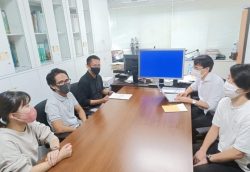
Tour of the Katahira Laboratory, Kyoto University
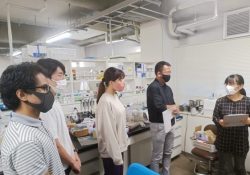
Presentation of and discussion with Prof. Takashi Watanabe about the results of his e-ASIA project on biorefinery
Achievement
Publications
- 2025
- 2024
- 2023
Awards
Best Poster Presentation Award in Session C - Chemistry, "Theoretical study of the formation of hydroxyl groups on Pt-doped ZnO (10-10) from the heterolysis of water"
The 48th International Congress on Science
Technology and Technology-Based Innovation (48th STT), December 1, 2022
→NEWS
- STAFF
-
- Wei XU
- Shinichiro Sawa
- Tetsuya KIDA
- Armando T. QUITAIN
- Junhua WANG
- Yoshihiro SEKINE
- Akira UEDA
- Yusuke INOMATA
- Muhammad Sohail AHMAD
- Jonas Karl N. AGUTAYA
- Nobleson KUNJAPPY
- Prafulla Bahadur MALLA
- Mohammad Atiqur RAHMAN
- Reetu Rani
- Kei TODA
- Tomoyasu MANI
- Agus Pulung SASMITO
- Tung Thanh TRAN
- Dario ZAPPA
- Daniel P. ZITTERBART
- Mitsuhiro AIDA
- U Rajendra ACHARYA
- Dmitri Aleks MOLODOV
- László PUSZTAI
- Yufeng ZHENG
- Gaochuang CAI
- Masahiko FURUTANI
- Hiroki MATSUO
- Zhongyue ZHANG
- Adam Karl SCHWARTZKOPFF
- Takashi ISHIDA
- Takumi HIGAKI
- Takahiro HOSONO
- Kei ISHIDA
- Makiko KOBAYASHI
- Ruda LEE
- Yuta NAKASHIMA
- Shin-Ichi OHIRA
- Atsushi SAINOKI
- Mitsuru SASAKI
- Keitaro TAKAHASHI
- Suttichai ASSABUMRUNGRAT
- Josep-Lluís BARONA-VILAR
- Nicorae BARSAN
- Jorge Norberto BELTRAMINI
- Olivier BOUTIN
- Paul BOWEN
- Pierre BREUL
- Maria Jose COCERO
- Patrice DELMAS
- Martin DIENWIEBEL
- Martino DI SERIO
- Derek ELSWORTH
- Carolina ESCOBAR
- Bruno FAVERY
- Etsuko FUJITA
- Tomonari FURUKAWA
- Jens HARTMANN
- Mohammad Abul HASNAT
- Yang JU
- Hoon KIM
- Ick Chan KWON
- Wen-Shing LEE
- Youn-Woo LEE
- Pavel LEJČEK
- Dongfang LIANG
- Bo LIU
- Tao LIU
- Hui LU
- Reiko ODA
- Yong Il PARK
- Shie-Ming PENG
- Christian RENTENBERGER
- Parasuraman SELVAM
- Amir SI LARBI
- Konstantinos Daniel TSAVDARIDIS
- Gioacchino (Cino) VIGGIANI
- Thomas WAITZ
- Yan XIAO
- Zhenghe XU
- Kazuki TAKASHIMA


